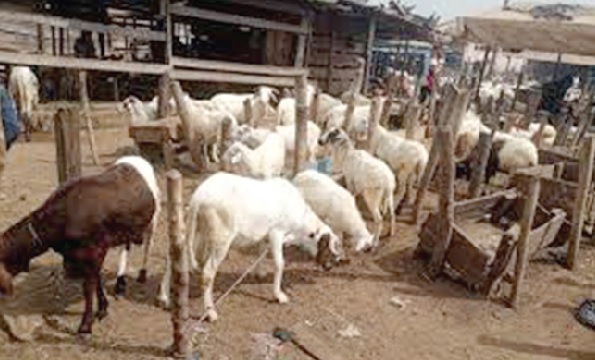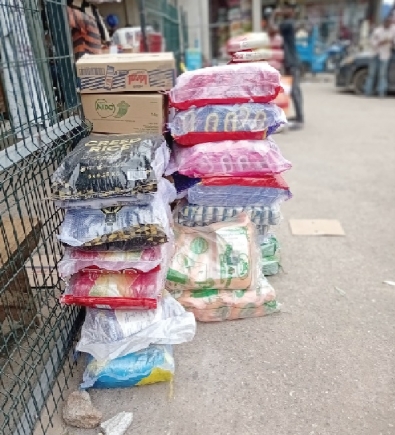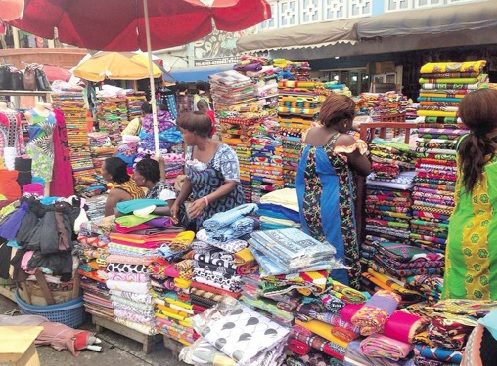As Muslims across the country prepare to celebrate Eid ul-Fitr, some traders have taken advantage of the festivities to increase prices, starting with rice, cooking oil, African print fabrics, meat and other food items.
During a visit by The Mirror to the Makola and Madina markets in Accra last Tuesday and Wednesday, the products had seen increases in prices within the last week.
The traders attributed the hikes mainly to increased demand and transportation costs, noting that currency depreciation, which used to be a major factor, had been stable for a while.
A trader at the Makola Market, Amanda Yaovi, told this reporter that a five-kilogramme bag of Lele rice, which was going for GH¢175 just a week ago, had become GH¢215.
Similarly, a 4.5-litre bottle of Frytol cooking oil had jumped from GH¢00 to GH¢250, a price which she said could be negotiated to GH¢240.
She added that, “as usual, prices will go down after the festivities, and as businesswomen, we had to take advantage of the season to make some sales,” she said jokingly.

“Sometimes, the whole month, you may not be able to make your desired sales, so times like these help us catch up; then we can restock,” another trader, Aisha Suleiman, who was a few metres away, said while defending the prices.
Further checks revealed a surge in the cost of live animals, particularly chicken, goats and cows.
At a poultry stall inside the Madina market close to the overhead bridge, a broiler which used to go for between GH¢150 and 350 now sells for between GH¢230 and GH¢380.
“Sometimes, it’s not our fault. When demand goes up, our workload becomes more so we have to charge more in order to catch up,” an attendant, Danfo, explained.
Same was the case for goats and cows with prices ranging from GH¢1,200 to GH¢25,000.
The African print markets at Makola and Kingsway in Accra were another price hike spot.

According to some traders, their main customers were the head porters, locally known as ‘Kayayei’ who typically travelled to their hometowns for the festivities.
“If you know Muslims, you’ll know that new and colourful clothing is a key part of their Sallah celebrations. They save up, then buy four yards or more of Hitarget, Woodin, or the cheaper China fabrics to sew their outfits,” said a fabric trader, Madam Araba Rita.
Another trader, Dorothy, explained that “we also have to take advantage of the season and make some profit but sometimes when their monies are not up to, we offer small discounts.”
The Mirror observed that fabrics such as Hitarget and Woodin, which were going for GH¢75 per yard a week ago, had moved to GH¢90. Chinese-made fabrics and imitations, often unbranded, ranged between GH¢20 and GH¢35 per yard, reflecting an increase of about GH¢6.
The price hikes were not uniform across all markets, as some traders maintained their rates while others offered discounts on products nearing expiration.
At the Yesu Mo provision shop in Madina, the prices of food items such as tomato paste, rice, seasoning, spaghetti, and tuna flakes were unchanged.
“I want to clear my stock, and I also don’t think it’s fair to raise prices just because of the season,” said the shop owner, Mrs Gladys Essuman.
“At my current prices, I still make a profit, so why increase them?”, she asked.
For the fashion market, sellers of ready-made clothing, typically imported from Togo, Burkina Faso, and Turkey, as well as secondhand dealers said they had seen an increase in sales and profit margins in the past two weeks leading up to Eid.
A shoe seller at Makola, Mr Isaiah Kokuvi Dorkenu, said “Period wei diɛ, ɛtisɛ Christmas anaa sɛ Easter for yɛn Moslem friends’ nu ɛnti ɛyaa omo tɔ adiɛ paaa.”
In other words, this period is like Christmas or Easter for our Muslim friends, so they shop a lot.
“The men mostly buy jeans, shoes, and jewellery for the celebrations, while the women focus on clothes and heels,” another trader who gave his name as Foster said.
Shoppers
In separate interviews, many customers said they were not surprised, as this happened every year.
“I already planned for the price increases because that’s how Ghana is; every festivity, prices go up. “What I did was to buy the main things I wanted, like a new wig and abaya, about a month ago because I knew the prices would rise,” said Miss Fadila Abdul Basit.
She added that she had also adjusted her spending habits to cope.
“Instead of buying plenty things, I only buy one or two things I need for the celebration.”
For Fatima Mohammed, a mother of four, the situation was frustrating.
“My husband and I usually buy new clothes, shoes and gifts for our children, but this year, we have to cut down. We won’t buy much. Besides, this is the ‘small Eid,’ so we’ll rather spend it on the ‘big Eid’ in September.”
Mr Baba Osama expressed a similar concern. He was not too bothered about the price hike, as his family had not made big plans for this celebration.
“I’ll get what we need regardless of the price, but we won’t be buying too much,” he said.

